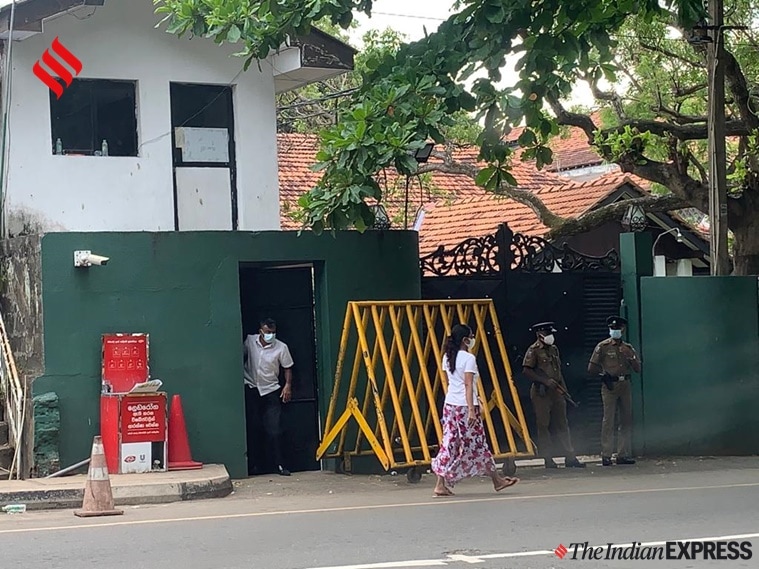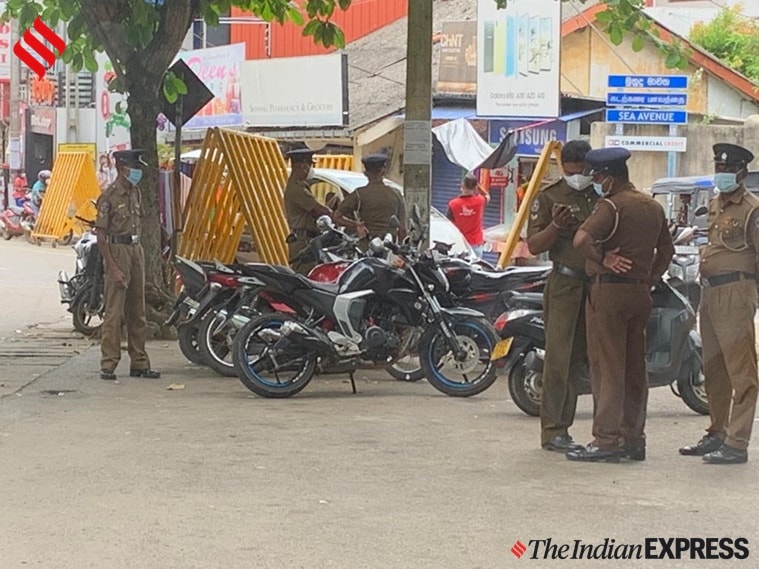
In the small fishing town of Tangalle, 200 km from Colombo, Carlton, the ancestral home of Sri Lanka’s ruling family, used to be thronged by adoring visitors whenever Prime Minister Mahinda Rajapaksa visited.
The mood has changed.
“In 2009, when he finished the war against the LTTE and came here, we were proud. We went to Carlton and like we do for the Buddha, we did the same for him,” said Roshan, a tuk-tuk driver waiting for passengers in the local market.
 A woman walks by the Rajapaksa residence in Tangalle, Sri Lanka. (Express Photo by Nirupama Subramanian)
A woman walks by the Rajapaksa residence in Tangalle, Sri Lanka. (Express Photo by Nirupama Subramanian)
“But if I meet him now, I will say, ‘thank you very much for finishing the war, but if you can’t do anything now, please hand over the job to someone better’,” said the 39-year-old father of one.
Explaining the dollar squeeze that has led to crippling shortages of essential commodities and an unaffordable rise in prices, Roshan said: “When I have 2 kg of rice at home, and 1 kg gets over, I know I have to buy 1 kg to replace it. But they waited till all the dollars were finished.”
Until a few months ago, it would have been difficult, if not impossible, to find anyone with a bad opinion of the Rajapaksas in this family pocket borough. In 2015, after Mahinda’s shock defeat in the presidential elections, tearful supporters greeted him in this village and pledged to bring him back to power. But it seems that even here, people have run out of patience.
Last week, around 200 local students were not as polite as Roshan in expressing their discontent. Shouting “Go Gota Go” against Mahinda’s brother President Gotabaya, they marched down the road towards Carlton. They broke through the yellow barricades and rushed towards the house until the police used teargas and water cannons to disperse them.
Today, Carlton is guarded by a posse of armed policemen, as well as the Special Task Force, an elite anti-terrorist paramilitary, with barricades at the ready.
 Security forces stand guard outside the Rajapaksa residence in Tangalle, Sri Lanka. (Express Photo by Nirupama Subramanian)
Security forces stand guard outside the Rajapaksa residence in Tangalle, Sri Lanka. (Express Photo by Nirupama Subramanian)
Hambantota district, which includes Tangalle, sent three Rajapaksas to Parliament — Mahinda’s son Namal, his brother Chamal and nephew Ajith — and three others from the same party. It gave Gotabaya 66 per cent of votes in the 2019 presidential election. But today, the discontent with the first family is all too evident.
“I also voted for the Rajapaksas,” said a woman who was standing in a queue outside the government-run Sathosa fair price shop in Hambantota town in a brave attempt to stock up for the local new year on April 14. “We have to manage with what little we get,” she said.
“No feeling for New Year,” said a teenaged girl at the shop. Her mother’s face wrinkled at the mention of Rajapaksa. “It’s sad. I voted for them and look at what they have done to us,” she said, pointing to her meagre purchase of rice.
Milani Hareem, who contested the Hambantota municipal council elections as an Opposition candidate, said large numbers of Rajapaksa supporters were rethinking their choice.
“This is their stronghold. There will always be supporters of the Rajapaksas here. But now, with the country in this situation, they are seeing the anger of the people, and they don’t want to be seen on the wrong side. We can’t predict how they will vote if an election is held, but the Rajapaksas are not as popular at this moment,” said Hareem, who belongs to the Malay Muslim community, a small ethnic group with a significant presence in Hambantota.
“The people have now understood that you cannot run a country by dividing them over language, race and religion,” she said. Unlike some other parts of the country with a sizeable Muslim population, Hambantota had not seen any communal incident, she said.
Hambantota town, 40 km from Tangalle, is the district headquarters, where the Rajapaksas first displayed their partiality for big-ticket infrastructure projects that would turn into white elephants and drain the country’s resources.
Hareem recalled how Mahinda Rajapaksa had said that he would build a city that would be “no less than Colombo”, but ended with wasteful expenditure.
Among them is the controversial Hambantota international port, which the government ended up leasing to its Chinese builders to repay the construction loans. Also on that list is the Mattala airport and a convention centre, which was built to host official functions but is now being hired out mostly for weddings.
Perhaps, the most used of all these infrastructure projects is the Chinese-built four-lane expressway from Colombo to Hambantota, and the international cricket stadium, where matches are held regularly.
Sithy Sabeena Rezik, a member of Sri Lanka Freedom Party, which contested the 2019 presidential and 2020 parliamentary elections as alliance partners of the Rajapaksas, said she is now telling supporters that SLFP is no longer part of the tie-up.
“We are helpless to do anything for the people at this moment. I feel really guilty about that. We can hardly show our faces to our supporters,” she said.
In Tangalle, in response to the protests, some Rajapaksa supporters have been seen near Carlton, holding placards that say: “We want Gota”. But Roshan, the tuk-tuk driver, is not impressed: “They are people who have been given jobs by the Rajapaksas. They have no choice but to come and show their support.”